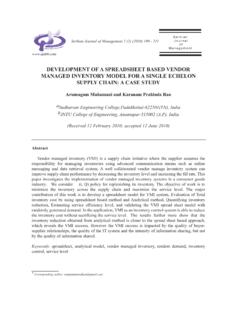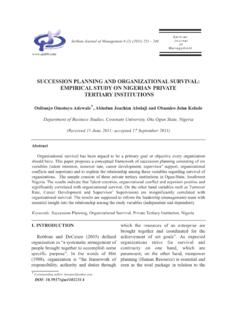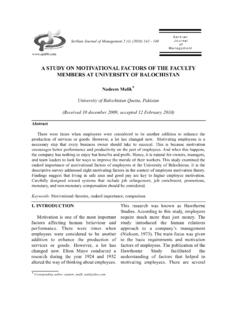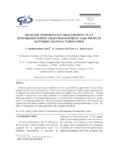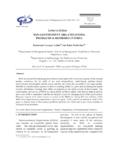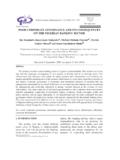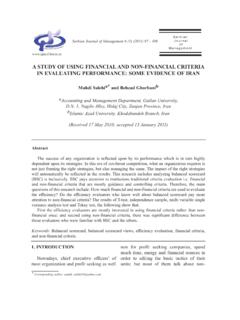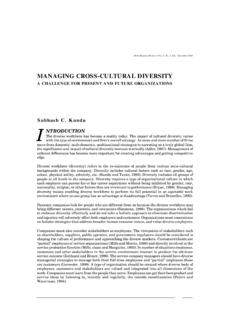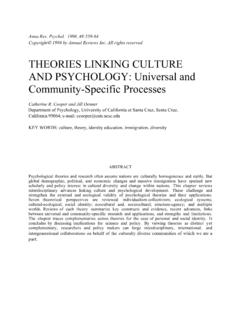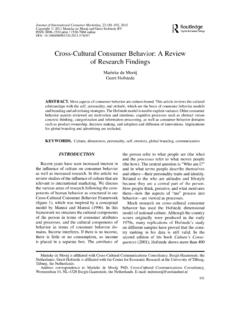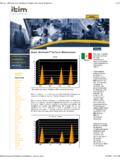Transcription of EMPLOYEE INVOLVEMENT IN DECISION MAKING …
1 1. INTRODUCTION The manufacturing sector in Nigeria hasbeen a focal subsector; but little is probablyknown about the influence of its employeeinvolvement in DECISION MAKING on firms particular attention in manufacturingemanates from the conviction that the sectoris a potential instrument of modernisation, acreator of jobs, and a generator of positivespill-over effects (Tybout, 2000). Moreover,the growth in manufacturing output has beena key element in the successfulEMPLOYEE INVOLVEMENT IN DECISION MAKING AND FIRMSPERFORMANCE IN THE MANUFACTURING SECTOR IN NIGERIA Owolabi Lateef Kuyea* and Abdul-Hameed Adeola SulaimonbaDepartment of Business Administration, University of Lagos, NigeriabDepartment of Business Administration, University of Ado-Ekiti.
2 NigeriaAbstract This study examines the relationship between EMPLOYEE INVOLVEMENT in DECISION MAKING andfirms performance in the manufacturing sector in Nigeria. Data were generated by means ofquestionnaires to 670 manufacturing firms on EMPLOYEE INVOLVEMENT in DECISION MAKING andperformance variables. Responses from the survey were statistically analysed using descriptivestatistics, product moment correlation, regression analysis and Z-test (approximated with theindependent samples t-test).
3 The results of the study indicate a statistically significant relationshipbetween EMPLOYEE INVOLVEMENT in DECISION MAKING and firms performance as well as reveal asignificant difference between the performance of firms whose EMPLOYEE INVOLVEMENT in decisionmaking are deep and the performance of firms whose EMPLOYEE INVOLVEMENT in DECISION MAKING areshallow. The findings also reveal the INVOLVEMENT of participating firms in EMPLOYEE INVOLVEMENT indecision MAKING . The implications of this study include the need for manufacturing firms todemonstrate high level of commitment to EMPLOYEE INVOLVEMENT in DECISION MAKING for : EMPLOYEE INVOLVEMENT in DECISION MAKING , firms performance, manufacturing sector,culture, Nigeria.
4 *Corresponding Journalof ManagementSerbian Journal of Management 6 (1) (2011) 1 - 15 of most economies that haveseen sustained rises in their per capitaincome (Soderbom and Teal, 2002). Focusshould therefore be on manufacturing andthose factors that may foster its , the justification for this study onmanufacturing firms in Nigeria. A modern forward-looking business doesnot keep its employees in the dark about vitaldecisions affecting them. It trusts them andinvolves them in DECISION MAKING at alllevels.
5 Command and control is no longeran adequate model. A more open andcollaborative framework will exploit thetalents of all employees (Hewitt, 2002).Employees must be involved if they are tounderstand the need for creativity and if theyare to be committed to changing theirbehaviour at work, in new and improvedways (Singh, 2009; Kingir and Mesci, 2010). EMPLOYEE INVOLVEMENT in DECISION makingserves to create a sense of belonging amongthe workers as well as a congenialenvironment in which both the managementand the workers voluntarily contribute tohealthy industrial relations (Noah, 2008).
6 In order to increase the workerscommitment and humanise the workplacewith the intention of improving workperformance and good citizenship behaviour,managers need to permit a high degree ofemployee INVOLVEMENT (Cohen et al., 1997).Thus, the INVOLVEMENT of workers in decisionmaking is considered as a tool for inducingmotivation in the workers leading to positivework attitude and high productivity (Noah,2009). However, researchers may besceptical about the value and relevance ofemployee INVOLVEMENT in DECISION MAKING tofirm performance.
7 It is in view of this that thestudy examines the following:1. Whether there is a significantrelationship between EMPLOYEE involvementin DECISION MAKING and firms performance. 2. Whether EMPLOYEE INVOLVEMENT indecision MAKING has a significant impact onfirms Whether there is a significantdifference between the performance of firmswhose employees INVOLVEMENT in decisionmaking are (deep) high and the performanceof firms whose employees INVOLVEMENT indecision MAKING are (shallow) low. 2. DELIMITATION OF THE STUDY This study examines the relationshipbetween EMPLOYEE INVOLVEMENT in decisionmaking and firms performance in themanufacturing sector in Nigeria.
8 The choiceof manufacturing sector was made becauseof its relevance and potential to Nigeria seconomic development. Companies includedin the sample were drawn frommanufacturing firms in Lagos state. Lagosstate was the focus because it is undoubtedlythe commercial nerve-centre of Nigeria, withthe largest concentration of industries(Iwugo et al., 2003), and over 55 percent ofmanufacturing firms in Nigeria have theirhead offices located in Lagos state (MAN,1994; MAN, 2003; MAN, 2006). Therefore,Lagos offers an attractive place for theresearch.
9 3. LITERATURE REVIEWE mployee INVOLVEMENT in decisionmaking, sometimes referred to asparticipative DECISION - MAKING (PDM) isconcerned with shared DECISION MAKING inthe work situation (Mitchell, 1973). Locke2 Kuye/ SJM 6 (1) (2011) 1 - 15and Schweiger (1979) define it as jointdecision MAKING between managers andsubordinates. According to Noah (2008), it isa special form of delegation in which thesubordinate gain greater control, greaterfreedom of choice with respect to bridgingthe communication gap between themanagement and the workers.
10 It refers to thedegree of EMPLOYEE s INVOLVEMENT in a firm sstrategic planning activities. A firm can havea high or low degree of employeeinvolvement. A high degree of INVOLVEMENT (deep EMPLOYEE INVOLVEMENT in decisionmaking) means that all categories ofemployees are involved in the planningprocess. Conversely, a low degree ofinvolvement (shallow employeeinvolvement in DECISION MAKING ) indicates afairly exclusive planning process (Barringer& Bleudorn, 1999) which involves the topmanagement only. A deep employeeinvolvement in DECISION MAKING allows theinfluence of the frontline employees in theplanning process.
